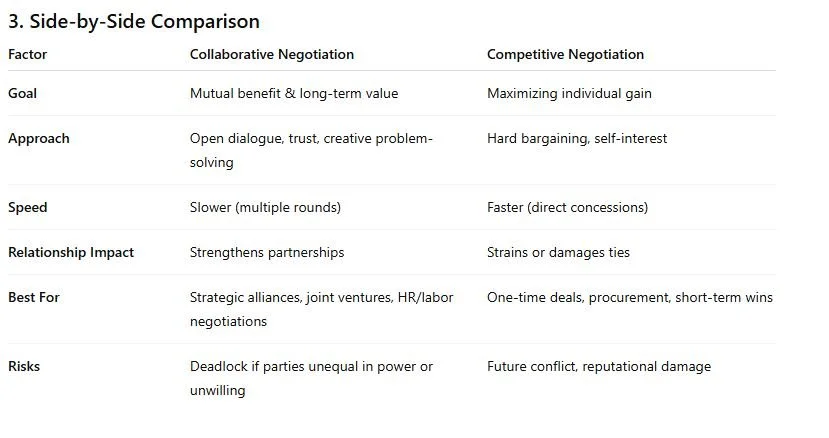Collaborative negotiation vs Competitive negotiation
In the business world, there are two main strategies for negotiation: collaborative and competitive. Collective negotiation is when both parties work together to reach a mutually beneficial agreement. In contrast, competitive negotiation involves each party attempting to gain as much advantage as possible.
This article will discuss the advantages and disadvantages of these two approaches so that you can decide on the best strategy for your situation.
Comparative Analysis: Collaborative vs. Competitive Negotiation in Business
In the business world, negotiation strategy can shape not only the immediate outcome of a deal but also the long-term relationship between parties. Two dominant approaches are often contrasted: collaborative negotiation, which emphasizes mutual benefit, and competitive negotiation, which prioritizes individual advantage.
This analysis compares both strategies, highlighting their strengths, limitations, and best-use scenarios, with real-world examples to illustrate their application.
1. Collaborative Negotiation
Definition:
A problem-solving approach where both parties work together to reach a mutually beneficial agreement through open communication, trust, and creative solutions.
Advantages:
Encourages innovation (new solutions emerge through joint brainstorming).
Builds trust and long-term partnerships.
Reduces the likelihood of future conflict.
Disadvantages:
Often time-consuming due to multiple discussion rounds.
Less effective if power imbalances exist (e.g., a small vendor negotiating with a global corporation).
Requires both parties to be willing to collaborate—otherwise, progress stalls.
Example:
Joint Venture Negotiations – Two companies forming a partnership invest significant time aligning goals, defining resource contributions, and ensuring both benefit. The process takes longer, but the resulting partnership often leads to sustainable growth.
2. Competitive Negotiation
Definition:
An adversarial approach where each party seeks to maximize its own advantage, often through hard bargaining, anchoring, and concessions.
Advantages:
Faster outcomes — decisions are reached quickly when parties push for their terms.
Useful when the relationship is not ongoing or trust is irrelevant.
Can work well in power-asymmetric situations, where one side has leverage.
Disadvantages:
Focus on short-term gains may harm long-term opportunities.
Creates animosity and damages trust between parties.
Risk of negotiation breakdown if one party feels exploited.
Example:
Procurement Contracts – A large retailer negotiating with small suppliers may push aggressively for lower prices. This can yield immediate cost savings but may discourage suppliers from working with them in the future or reduce quality to compensate.
4. When to Use Each Strategy
Choose Collaborative Negotiation when:
The relationship is strategic or long-term.
Both parties bring complementary resources or knowledge.
The deal involves complex problem-solving (e.g., mergers, alliances, HR settlements).
Choose Competitive Negotiation when:
Speed is critical, and the relationship is less important.
The situation is transactional or one-off.
You have strong leverage or are dealing with an aggressive counterpart.
5. Hybrid Approach: The Middle Ground
In practice, many negotiators use a hybrid strategy: starting with a collaborative tone to explore possibilities but switching to competitive tactics on specific deal terms (like pricing). This allows businesses to balance efficiency and relationship management.
Example:
A tech firm negotiating with a supplier might collaborate on joint product innovation but negotiate competitively on the per-unit cost.
6. Conclusion
Neither collaborative nor competitive negotiation is universally superior. The most effective negotiators adapt their strategy to the context and relationship stakes:
Collaborative → best for long-term partnerships and creative problem-solving.
Competitive → best for short-term, transactional outcomes.
Ultimately, the skill lies in recognizing when to cooperate for value creation and when to compete for value claiming—while maintaining professionalism and respect to preserve future opportunities.
At Michal Chmielecki, we are industry leaders in negotiation consulting, empowering companies to optimize their negotiation outcomes and achieve measurable success. With years of experience across diverse sectors, we understand the intricacies and challenges companies face in securing valuable deals.

